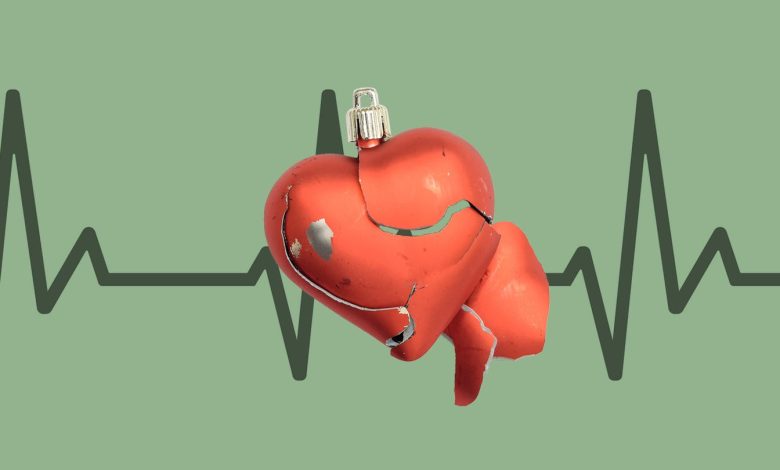Increased Heart Attack Danger During the Holidays

[ad_1]
While the holidays are a time of joy and togetherness for many, they are also a time when serious cardiac events peak. The American Heart Association (AHA) warns that more people die from heart attacks during the last week of December than at any other time of the year.
The health organization recently highlighted previous research finding that more cardiac deaths happen in the United States on December 25 compared with any other day, followed by December 26 and January 1. The analysis was based on an examination of a national database of all deaths in the United States over 28 years between 1973 and 2001.
This year, holiday heart attack risk may be even greater because Christmas falls on a Monday.
Serious heart attacks are more likely to occur on Mondays than other days of the week, according to a study presented at the British Cardiovascular Society conference in the summer of 2023. Looking at records of more than 10,000 individuals in Ireland who were hospitalized with a complete blockage of a major coronary artery, scientists determined that the risk of such an event was 13 percent higher on Mondays compared with other days of the week.
Factors That Contribute to ‘Holiday Heart’
The exact reasons behind the heightened Christmas risk aren’t entirely known, but health authorities suspect that greater anxiety and overindulgence in rich foods and drinks may play a role.
“All these risk factors are enhanced around the holidays — people are drinking more alcohol, not watching their diet, and they are under a lot more stress [from planning, socializing, traveling, and busy schedules],” says American Heart Association volunteer Fatima Rodriguez, MD, an associate professor in cardiovascular medicine with Stanford Health Care in California. “They all contribute to a phenomenon we call ‘Holiday Heart.’”
Other elements that increase the possibility of heart troubles include cold weather, which can restrict arteries, and the spread of respiratory illness such as flu, COVID, and RSV, which can all put greater demands on heart function.
Don’t Ignore Symptoms, and Stay in Tune With How You Feel
People may dismiss symptoms or put off addressing them because it’s a busy time of year, according to Rodriguez. Although no one wants to spend time in a doctor’s office or hospital during the holidays, the American Heart Association reminds the public that healthcare providers are ready to help no matter the season and seeking medical attention can save your life.
Recognizing the signs of heart attack or stroke is vital, but they differ somewhat.
The symptoms of a heart attack, per the AHA, include:
- Discomfort in the chest or other areas of the upper body, such as the arms, stomach, shoulders, neck, or jaw
- Shortness of breath
- Breaking out in a cold sweat, lightheadedness, or nausea
According to UC Davis Health, it’s not uncommon to mistake signs of heart attack for heartburn.
Stroke symptoms on the other hand, according to the AHA, include:
- Face drooping
- Weakness or numbness in one arm
- Confusion or slurred speech
- Difficulty walking or seeing
- Severe headache
Experts advise people who have heart disease, or risk factors for heart trouble like high blood pressure, to stay on top of their health maintenance. “Remember to take your medications every day just as you would and continue to prioritize healthful habits just as you have during the year,” says Dr. Rodriguez.
The AHA also encourages the public to be on the alert for family or friends who are experiencing distress. When someone has a heart attack or goes into cardiac arrest, starting CPR (cardiopulmonary resuscitation) immediately and calling 911 may save their life.
Nearly everyone can learn to do hands-only CPR. You can find a short instructional video at Heart.org.
Heart-Healthy Tips for the Holidays
The American Heart Association offers a few suggestions to help keep heart trouble away at the holidays.
- Stay active. The AHA recommends at least 150 minutes of physical activity per week, and this number usually drops during the hustle and bustle of the holidays. “You might consider starting a tradition of taking a walk before or after a big meal,” says Dr. Rodriquez, who adds that there are many ways to get some exercise with family and friends.
- Celebrate in moderation. While it’s okay to indulge in treats and drink to some extent, AHA stresses to not overdo it. Try reaching for fruit to satisfy the sweet craving, and be aware of your salt intake.
- Take time for yourself. Be sure to make room in a busy holiday schedule to do the activities that help you de-stress, such as doing yoga, taking a walk, or reading a book. “Be mindful and take care of your mental health,” says Dr. Rodriguez. “Maybe take a few minutes to wake up a little bit early and take some time for yourself.”
[ad_2]




